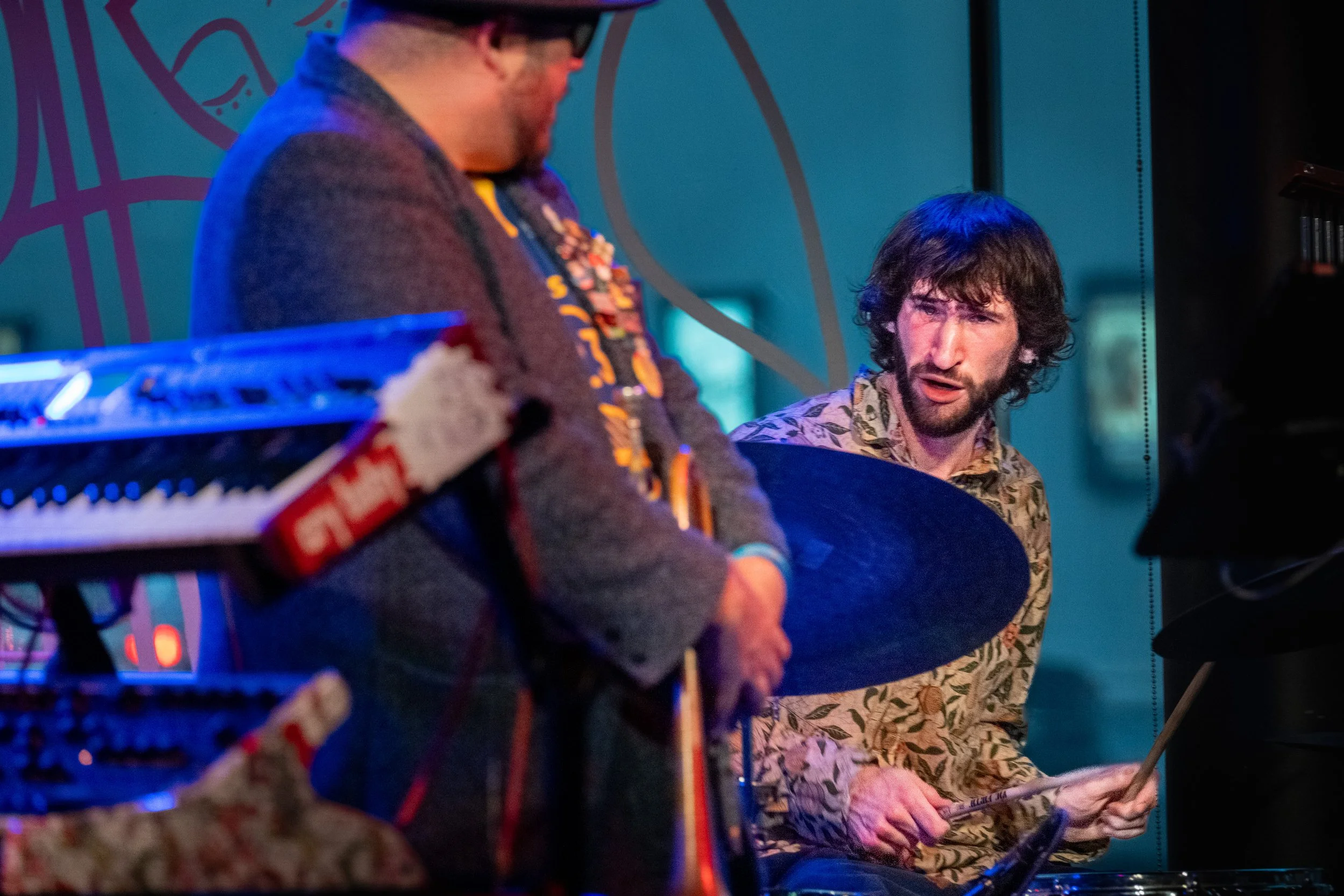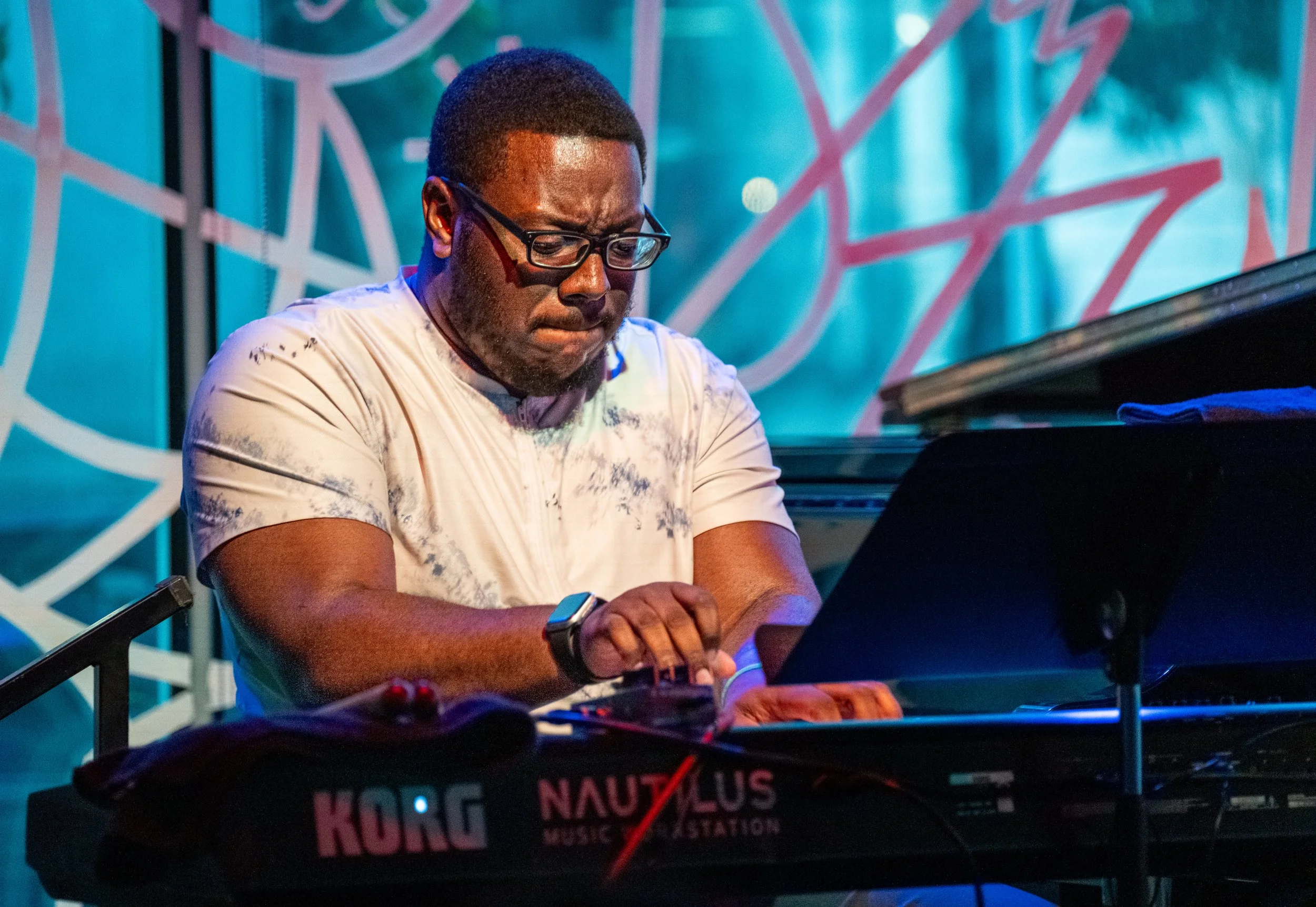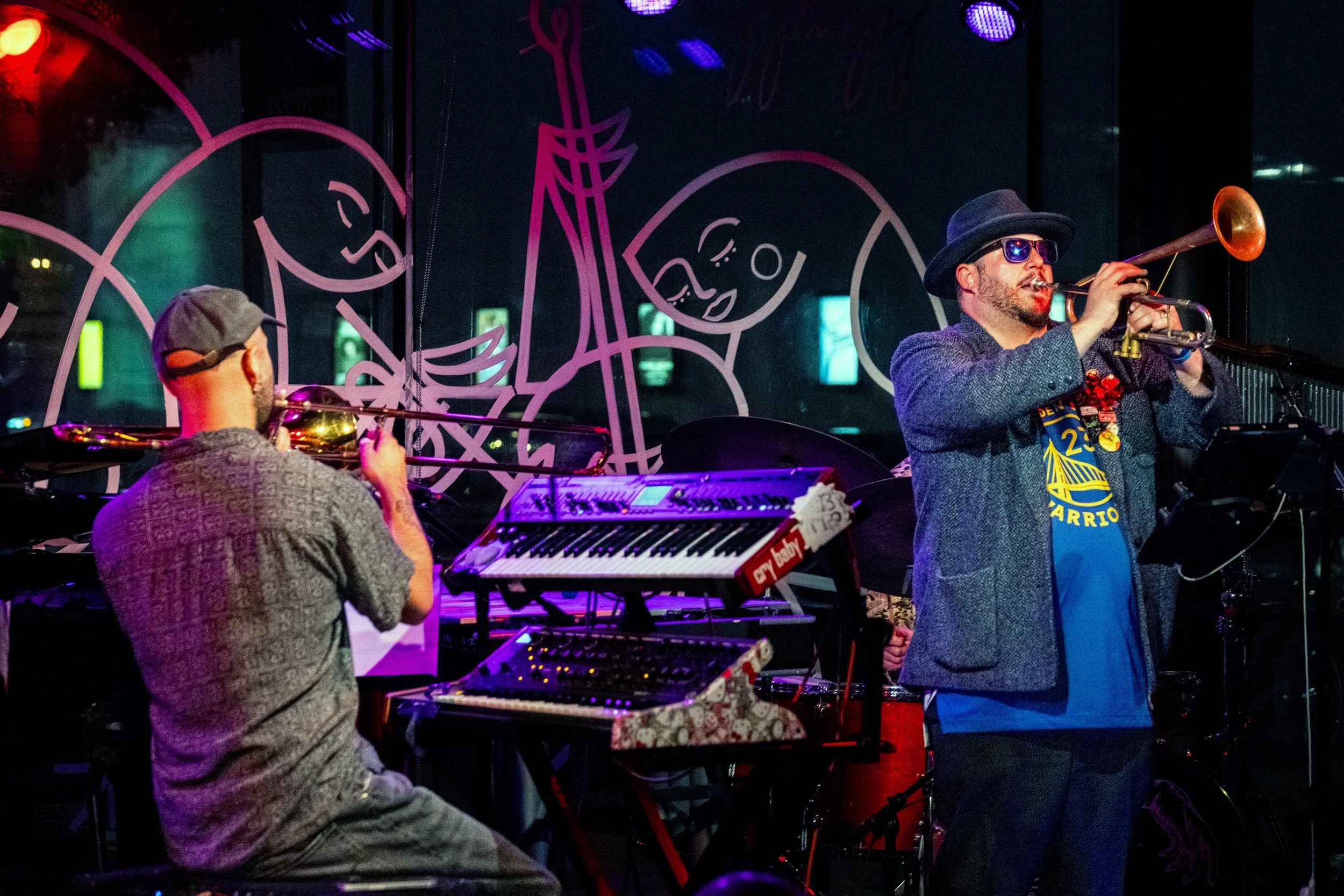LABRATS Rewire Mwandishi at the Joe Henderson Lab
Joe Henderson Lab
Hotplate Series season opener (early set)
San Francisco, California
September 12, 2025
Thomas Molina. Photo: Steve Roby
This show hit like a voltage spike to the sternum—disciplined chaos, loud purpose, no hedging.
The room was already on edge before a note. Three fans who’d driven down from Sacramento staked the front row and swore they’d “never seen anything like the drummer.” A DJ in the lobby leaned into lo-fi jazz as ticket holders lined up; late rush-hour traffic crawled outside; passersby pressed their faces against the windows. Inside, teenagers claimed the second and third rows. One hundred seats. Sold out. Air held tight, ready to snap.
The Hotplate banner matters here. A monthly home-field challenge: Bay Area players take a classic and turn up the heat, risking failure—tonight’s canvas—Mwandishi.
Four musicians walked on slowly, like they owned the oxygen. Drummer Jacob Swedlow tucked himself back right, partially hidden, checkerboard sweater ablaze; a rhythmic engine you couldn’t see but couldn’t ignore. Joey Archie split duty between a Yamaha grand and a Korg Nautilus. Miguel Recendez set up a small army—bass synth, Moog, Deepmind 12—then reached for a trombone like it was another fader in the mix. Thomas Molina brought a bent-bell trumpet and a cabinet of noise: dynamic wah, phaser, MXR mixer, Boss SY-300, tape-echo ghosts, space delays. The signature wash—modulating, warbly, lo-fi—hovered at the edge of every phrase.
“Not many stops,” Swedlow warned. It wasn’t a boast. It was a plan.
Jacob Swedlow - Photo Steve Roby
“Toys” did not begin so much as strike—Low-end, like steel piling driven into wet soil. The first wave hit the chest and returned as a second heartbeat—not a metaphorical one, but actual pressure. Air thickened; heads involuntarily reset to a slower clock; conversations (the few that tried to persist) died by reflex. Trumpet wore mirror shades and a Warriors 23 tee under his jacket—cool posture, colder tone—and traced smooth lines over Recendez’s subfloor. Archie laid chord sheets like asphalt, then skidded off into synth land. The band punched, held, punched again. No “warm up.” No “getting comfortable.” The song arrived as a shove. As in: Are you awake? Are you here? Are you ready to work?
“Sleeping Giant” followed, drummer’s catnip by design, with Swedlow jumping to vibraphone for color before re-seating at the kit—cymbal crests, hi-hat rumbles, the whole thing breathing like a slow animal. Piano solo, then long-tail Korg verbs; Recendez shot laser harmonics from the Moog and switched to trombone as if changing shoes. Trumpet climbed, the room clapped in mid-phrase—unplanned, deserved. A drummer’s shout—rare, loud—signaled the stop. Breath out. The promise of no stops was kept.
Between pieces came the explanation and the dare. “We’re a Sacramento band, we play with a lot of rappers and singers and a lot of hip-hop, but we are all jazz nerds. We got our pieces of paper at various schools.” Smiles in the crowd—also a challenge: don’t mistake fluency for dilution. Later, Swedlow pointed nine minutes down the road, toward the old Heider rooms, and to Mwandishi—the soup, the blueprint, the proof that groove, noise, and free thought can co-exist without apology. The band’s study with elders, their improv-first process, and the Mwandishi link have been public and consistent. The receipts were all over the stage tonight.
Joey Archie - Photo Steve Roby
“You’ll Know When You Get There” provided the night with its most precise snapshot of purpose. Synths swelled until the air hummed; trombone shouldered in—broad, unpolished, human—while the cymbals crashed in sheets that didn’t so much fill space as compress it. The melody built, slow, patient, then filled the room—completely—then stopped—a suspended breath. Then the rat-a-tat—snare-like small arms fire—kicked off again. Trumpet ascended, then deliberately fell, tipping the hat to the drums. Synth nodded to Korg—the handoff clear—Korg nodded back to the kit—gratitude clear—players grinning at the precision of the exchange. Trumpeter exhaled—loud enough to hear. The melody returned, now led by a low trumpet, and the drums flicked the trigger into the next tune. The Korg player wiped his face; the three Sacramento diehards in front of him were beaming, as if they’d brought this with them. Pause. Fast snare chatter. Burst of applause. Then—soft trumpet notes, and that human noise you only get when the whole room realizes it stayed together through something delicate and didn’t break it.
“Hancock’s Mwandishi band was like a primordial soup of what music could sound like.”
“Ostinato (Suite for Angela)” was the thesis and the edge. Fifteen over eight—loping, lurching, never settling into the thoughtless comfort of fours—creates a walking meditation where the floor shifts and the mind stays awake. The groove is a wheel; the wheel is not smooth; the bumps are the point. Call-and-response built from that lopsided spine until voices stacked into a living essay—rhythmic complexity as a direct line to the African diaspora, endurance music for a country that still can’t square punishment with liberation. The title is a clue; the dedication is the argument. Angela Davis isn’t an abstraction here; she’s the pressure in the barlines.
A broader truth surfaced: the way Herbie wrecked and rebuilt his tools as a kid—screwdriver into clocks, watches, model trains, pry them open, learn the function, then test the limits—still holds. LABRATS operate with the same urge. Unscrew. Study. Swap parts. Reassemble. Run it hot and see what breaks. They learned that ethos from mentors, from school, from road miles, from hours in a garage making the floor shake, and from the kind of sacrificial listening that treats the audience like a fifth band member. It was all on stage tonight.
l-r: Miguel Recendez (trombone) and Thomas Molina (trumpet). Photo: Steve Roby
“Wandering Spirit Song” arrived with a warning—“last song, surprise at the end”—and delivered on both. Molina’s trumpet took the first half—long tones drifting in delay fog, while Recendez’s trombone became the ballast. You could feel the sweat begin to bead on forearms and brows; Archie’s right hand stayed high on the Korg while the left tapped the piano lid between phrases; Swedlow leaned forward, shoulders carving time, mouth open, counting without speaking. Strain was visible: pedals clicked, wrists tightened, chins lifted, back muscles fired. Noise gathered—feedback halos, floor-tom thunder, a tape echo that rattled the light fixtures—and then cleared like weather. The exit ramp was not smooth by convention; it was earned.
Then the surprise—“Actual Proof!”—the night’s best spike of adrenaline. This version was less about textbook precision than about making the tune run, really run—tempo like a conveyor belt, ride cymbal like a loom, trumpet shredding through a cloud of pedals, keys slicing pocket-sized stabs into the lanes. It flirted with blur. It never lost the line.
Strengths? Plenty. The band can pivot without committee meetings—hip-hop reflexes with jazz discipline. Swedlow directs traffic invisibly and keeps the room honest; his time is a floor, not a leash. Archie’s two-keyboard conversation lands with clarity—acoustic truth at the Yamaha, texture and risk at the Korg. Recendez is the hinge—electric low-end authority, then trombone color, then back to electronics with a grin; you can build a set on a hinge like that. Molina’s FX chain—especially the modulating delays and tape echo—creates an aura that sells the Mwandishi cosmology without pretending it’s 1971.
Context matters, and LABRATS didn’t hide from it. Between tunes, Swedlow framed the set as homage and experiment: hotplate as pressure cooker; Mwandishi as source code; Sacramento as the lab where they break and rebuild.
And then—important—he called out the audience as collaborators: listen to us and we’ll listen back. The proof was evident in micro-adjustments: a softer ride pattern when the front row leaned in; a narrowed synth filter when heads tilted; and a faster cut when chatter started at the bar. That’s craft. That’s work. That’s respect.
Post-show, the temperature in the room dropped ten degrees, and the volume rose twenty percent. Musicians shook hands, signed vinyl, fielded questions, smiled big, and laughed hard. They moved through the crowd and out to the lobby to reset before the late set. The three who drove down from Sacramento looked vindicated; the teenagers looked satisfied; the rest looked like they’d found a band that treats risk as a requirement, not an accessory.
Final thought—cut and simple: this is what a tribute should do—honor the blueprint, smash the casing, rebuild the engine, and drive it like it was built for today.
Setlist: “Toys,” “Sleeping Giant,” “Ostinato (Suite for Angela),” “You’ll Know When You Get There,” “Wandering Spirit Song,” and “Actual Proof.”
Listen to our podcast interview with Jacob Swedlow here.




